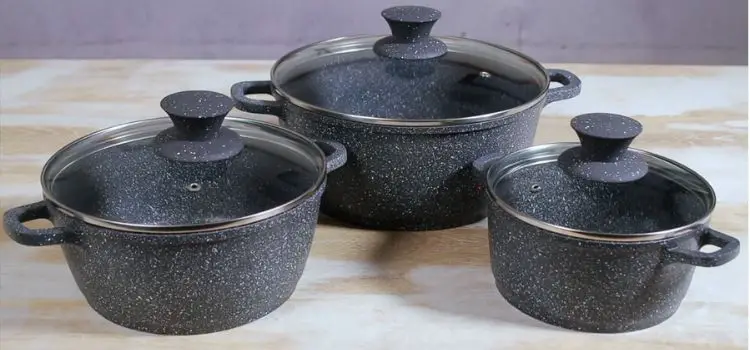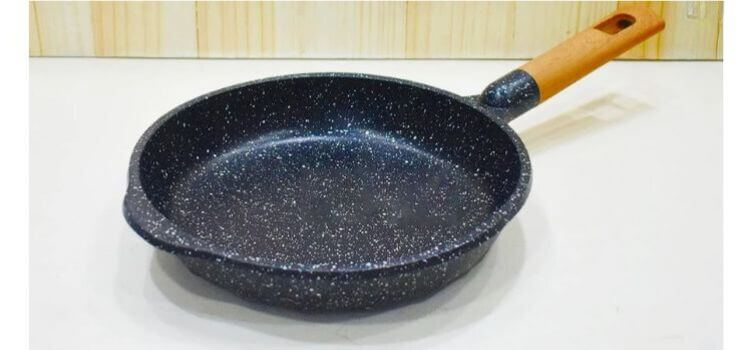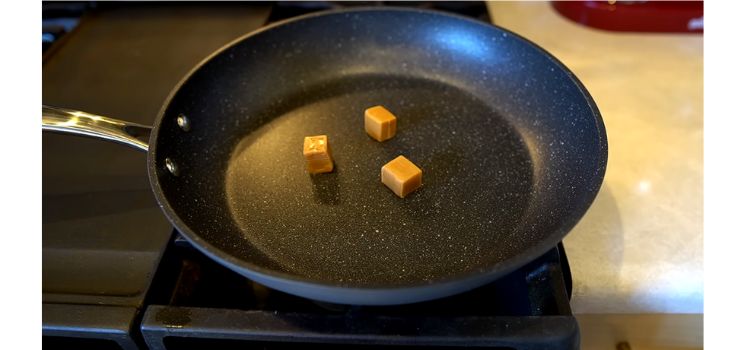
Granite cookware has gained popularity in recent years due to its sleek appearance and non-stick properties. But with so many cookware options available, it’s natural to wonder, “Is granite cookware safe?” Ensuring the safety of your cookware is crucial for maintaining a healthy kitchen.
In this article, we will explore the composition, benefits, and potential safety concerns of granite cookware. By the end, you’ll have a clear understanding of whether granite cookware is a safe choice for your cooking needs. Let’s dive into the details and find out more about this popular kitchenware option.
What is Granite Cookware?
Granite cookware is a popular type of kitchenware known for its durability and non-stick surface. Despite its name, granite cookware is not made from solid granite. Instead, it typically features a coating that mimics the appearance of granite.
Definition and Composition
Granite cookware is usually made by coating a metal base, such as aluminum or stainless steel, with a layer that resembles granite. This coating often contains porcelain or ceramic materials that give the cookware its distinctive look and non-stick properties. The inner core, usually made of aluminum, ensures even heat distribution and helps prevent hot spots during cooking.
Difference Between Real Granite and Granite-Coated Cookware
It’s important to note that granite cookware is not the same as real granite. Real granite is a natural stone used for countertops and other surfaces, while granite-coated cookware is metal with a specially designed coating. This coating is what provides the cookware with its non-stick surface and granite-like appearance.
Common Materials Used in Granite Cookware
Granite cookware generally consists of an aluminum core coated with a granite-like layer. The aluminum core ensures efficient heat distribution, making cooking easier and more consistent. The granite-like coating, often made of porcelain or ceramic, provides a non-stick surface that makes cooking and cleaning a breeze.
Related Topic: Granite vs Ceramic Cookware: Which One Should You Choose
Benefits of Granite Cookware

Granite cookware offers a range of benefits that make it a favorite in many kitchens. Here are some key advantages:
Non-Stick Properties
One of the main benefits of granite cookware is its non-stick surface. This makes cooking easier as food doesn’t stick to the pan, allowing for healthier cooking with less oil. It also means that cleaning up after meals is quick and simple.
Durability and Longevity
Granite cookware is known for its durability. The strong coating and sturdy construction mean that these pots and pans can withstand regular use without wearing out quickly. This longevity makes granite cookware a good investment for your kitchen.
Aesthetic Appeal
Granite cookware is visually appealing with its sleek, stone-like appearance. It adds a touch of elegance to your kitchen and can complement a variety of kitchen decor styles. The attractive design makes it not only functional but also a stylish addition to your kitchenware collection.
Heat Distribution and Retention
Granite cookware typically has an aluminum core, which ensures even heat distribution. This means that your food cooks more evenly, reducing the chances of hot spots or unevenly cooked meals. Additionally, granite cookware retains heat well, keeping your food warm for longer.
Easy Maintenance and Cleaning
Maintaining and cleaning granite cookware is easy due to its non-stick surface. Food residue can be wiped off effortlessly, and many granite cookware pieces are also dishwasher safe. This convenience saves you time and effort in the kitchen, making meal preparation and cleanup more enjoyable.
Safety Concerns
While granite cookware offers many benefits, it’s important to consider some safety concerns associated with its use. here are some Key points to keep aware of:
Potential Health Risks Associated with Cookware Materials
The materials used in cookware can sometimes pose health risks. Granite cookware, in particular, may have coatings that could potentially release harmful substances when damaged or overheated. It’s essential to understand what your cookware is made of and how it might affect your health.
Comparison with Other Types of Non-Stick Cookware (e.g., Teflon)
Granite cookware is often compared to other non-stick options like Teflon. Teflon, for example, has been known to release toxic fumes when overheated. Granite cookware is generally considered a safer alternative, but it’s still important to use it properly to avoid any health risks.
Presence of Harmful Chemicals (e.g., PTFE, PFOA) in Some Granite Cookware
Some granite cookware may contain chemicals such as PTFE (polytetrafluoroethylene) and PFOA (perfluorooctanoic acid), which have been linked to health concerns. PTFE is used in many non-stick coatings, while PFOA has been used in the manufacturing process of some non-stick products. It’s crucial to check whether the granite cookware you purchase is free from these harmful chemicals.
Impact of Overheating on the Release of Toxic Substances
Overheating any non-stick cookware, including granite-coated ones, can lead to the release of toxic substances. When granite cookware is heated beyond its recommended temperature, the coating can break down, potentially releasing harmful fumes. To ensure safety, always use your cookware within the recommended temperature range and avoid preheating empty pans.
Evaluating the Safety of Granite Cookware
When considering the safety of granite cookware, it’s important to look at various aspects such as regulations, certifications, consumer feedback, and scientific research. Here’s a comprehensive overview:
FDA Regulations and Safety Standards
The U.S. Food and Drug Administration (FDA) sets regulations and safety standards for materials used in cookware. Granite cookware sold in the United States must comply with these standards to ensure that it is safe for food contact. The FDA ensures that the materials used do not release harmful levels of substances into food, making granite cookware generally safe for use.
Independent Safety Certifications (e.g., NSF, SGS)
Independent organizations such as NSF International and SGS provide additional safety certifications for cookware. NSF International certifies products that meet strict public health standards, while SGS conducts testing and certification services to ensure product safety and compliance. Look for granite cookware that has these certifications, as they provide an extra layer of assurance regarding the safety and quality of the products.
Consumer Reviews and Expert Opinions
Consumer reviews and expert opinions can offer valuable insights into the safety and performance of granite cookware. Many users report satisfaction with granite cookware’s non-stick properties and durability. However, some reviews highlight concerns about the potential presence of harmful chemicals and the importance of proper use and maintenance. Expert opinions often emphasize the need for consumers to choose reputable brands and verify safety certifications.
Research Studies on the Safety of Granite Cookware
Several research studies have been conducted to evaluate the safety of non-stick cookware, including granite-coated products. Studies generally find that granite cookware is safe when used according to manufacturer instructions. For example, research shows that the non-stick coating in granite cookware, when free from PTFE and PFOA, does not release harmful substances at normal cooking temperatures. However, overheating the cookware can degrade the coating and potentially release toxic fumes, similar to other non-stick options.
Is Granite Cookware Safe?

Granite cookware is generally considered safe for everyday use. It features a non-stick coating that is typically free from harmful chemicals like PTFE and PFOA, reducing the risk of toxic fumes. However, it’s important to use granite cookware within the recommended temperature range and avoid overheating, as this can degrade the coating and release potentially harmful substances.
Choosing high-quality granite cookware that meets FDA regulations and has independent safety certifications, such as those from NSF or SGS, further ensures its safety. Proper care and maintenance, like using non-metal utensils and hand-washing, can also help maintain the safety and longevity of granite cookware.
Tips for Using Granite Cookware Safely
Using granite cookware can be a great addition to your kitchen, but it’s important to follow some guidelines to ensure its safety and longevity. Here are some practical tips:
Proper Care and Maintenance
To keep your granite cookware in good condition, always follow the manufacturer’s care instructions. Typically, you should wash the cookware by hand with mild soap and water. Avoid using rough cleaners or scrub pads, as they can scratch and damage the non-stick coating. Dry the cookware thoroughly after washing to prevent water spots and maintain its appearance.
Safe Cooking Temperatures
Granite cookware is designed to withstand high temperatures, but it’s essential to use it within the recommended range. Most granite cookware can handle temperatures up to 500°F (260°C). Always preheat the pan on low to medium heat and avoid heating it while empty. Overheating can damage the coating and potentially release harmful substances.
Avoiding Metal Utensils to Prevent Scratching
To preserve the non-stick surface of your granite cookware, use utensils made of wood, silicone, or plastic. Metal utensils can scratch and damage the coating, reducing its effectiveness and longevity. If the coating gets scratched, it can also expose the metal underneath, which may lead to health concerns and reduced non-stick performance.
Ensuring the Cookware is Free from Harmful Chemicals
When purchasing granite cookware, check that it is free from harmful chemicals like PTFE (polytetrafluoroethylene) and PFOA (perfluorooctanoic acid). Many manufacturers now offer granite cookware that is labeled as PTFE and PFOA-free, ensuring that it does not release toxic fumes when heated. Look for certifications and labels on the packaging to confirm the absence of these chemicals.
Frequently Asked Questions
Is Granite Cookware Safe For Health?
Yes, granite cookware is generally safe for health. It is free from harmful chemicals like PFOA and PTFE. It provides a non-stick surface without releasing toxins.
Does Granite Cookware Contain Harmful Chemicals?
No, granite cookware does not contain harmful chemicals. It is typically free from PFOA and PTFE. This makes it a safer alternative to traditional non-stick cookware.
Can Granite Cookware Be Used On All Stovetops?
Yes, granite cookware can be used on all stovetops. It is versatile and works with gas, electric, and induction cooktops. Always check the manufacturer’s guidelines.
Is Granite Cookware Better than Teflon?
Granite cookware and Teflon are both popular non-stick options, but they differ in several key aspects. Granite cookware typically has a more natural and chemical-free coating, while Teflon cookware is coated with polytetrafluoroethylene (PTFE), which can release harmful fumes if overheated. Granite cookware is generally considered safer because it is often free from PTFE and PFOA, chemicals linked to health concerns. Additionally, granite cookware tends to be more durable and scratch-resistant than Teflon, making it a more long-lasting option for many users.
How Long Does Granite Cookware Last?
The lifespan of granite cookware depends on several factors, including the quality of the materials, how well it is maintained, and the frequency of use. High-quality granite cookware can last for several years, especially if it is properly cared for. Avoiding metal utensils, using the cookware within recommended temperature ranges, and hand-washing instead of using a dishwasher can help extend its life. Regular maintenance and careful use are key to preserving the non-stick surface and overall durability of granite cookware.
Are There Any Known Health Risks Associated with Granite Cookware?
Granite cookware is generally considered safe when used correctly. The main health risks associated with cookware arise from the potential release of harmful chemicals. Many granite cookware brands are free from PTFE and PFOA, reducing the risk of chemical exposure. However, overheating granite cookware can still pose a risk, as the non-stick coating may degrade and release fumes. To minimize health risks, always use the cookware within the recommended temperature range, avoid preheating it empty, and choose products that are certified free from harmful chemicals.
Leave a Reply